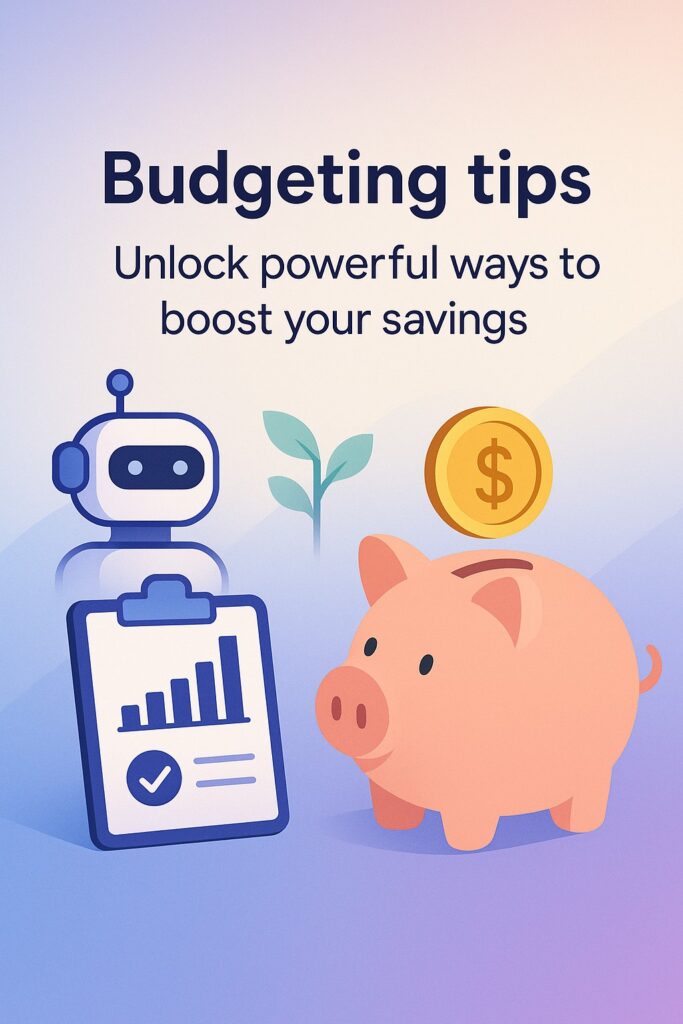Take control of your cash with easy monthly budgeting tips that help you save more, spend smarter, and stress less every single month.
Trying to manage your money each month can feel like a lot—especially when you’re juggling school, part-time jobs, or just learning how to handle expenses. That’s where monthly budgeting tips come in handy. They’re simple tricks and strategies that help you track your money, spend smarter, and still have enough left for fun.
Monthly budgeting tips aren’t just about saving. They help you see where your cash goes, avoid overspending, and plan. Whether you’re paying for textbooks, grabbing fast food, or saving for something big, budgeting helps you stay in control.
Most importantly, these tips give you peace of mind. You don’t have to guess if you’ll make it to the end of the month. With the right monthly budgeting tips, you’ll build strong money habits now that make adult life way easier later.
Table of contents
- Monthly budgeting tips with AI tools for personal finance
- Best budgeting apps with AI: Monthly budgeting tips
- Monthly budgeting tips using smart budgeting tools
- AI-based monthly expense trackers for better Monthly budgeting tips
- Automated budgeting software: Monthly budgeting tips
- How does AI improve monthly budgeting for young users?
- Monthly budgeting tips with tech-driven finance tools
- Machine learning tools and monthly budgeting tips
- How to create a budget using AI apps and smart tips?
- Monthly budgeting tips for tech-savvy beginners
- FAQs: Monthly budgeting tips
- Conclusion
Monthly budgeting tips with AI tools for personal finance

Use smart AI tools to stay on top of your monthly spending. Managing money isn’t always easy, especially when you’re juggling school, side gigs, or just starting out. That’s where AI tools come in handy. These tools help you track spending, set savings goals, and get alerts when you’re close to overspending. With just a few taps, you can stay organized and avoid surprise costs.
Use AI apps to track every expense
Apps like Cleo, YNAB, and Mint utilize AI to help you stay on track with your spending. They connect to your bank accounts and automatically sort your purchases. This makes it super easy to see where your money goes each month. You don’t need to log every dollar manually—AI does it for you.
Monthly budgeting tips become easier to follow when you can see your habits in real time. Most of these apps even send weekly summaries and offer suggestions to help you save more.
Set spending limits with smart reminders
Many AI finance apps let you create spending categories. You can set monthly limits for things like food, entertainment, or online shopping. When you’re about to hit your limit, you get a friendly reminder.
These little nudges help you make smarter choices before your money runs out. It’s one of the most useful monthly budgeting tips for students who want to build good habits early.
Learn from your spending behavior
AI tools don’t just track your spending—they analyze it. Over time, they spot patterns and give you insights. For example, if you always spend more on weekends, the app might suggest a lower weekday budget to balance things out.
That’s a powerful way to take control. These personalized suggestions turn basic monthly budgeting tips into smart, data-based actions that work.
Best budgeting apps with AI: Monthly budgeting tips
Stay in control of your money with smart budgeting apps. If you struggle to manage your money each month, you’re not alone. Budgeting can feel confusing, but AI-powered apps make it easier. These apps help you plan, track, and adjust your spending automatically. All you need is your phone and a few minutes to get started.
Cleo: Budgeting with attitude monthly budgeting tips
Cleo is one of the most fun AI budgeting apps out there. It connects to your bank and gives you updates in a chat format. You can ask questions like, “How much can I spend today?” or “What did I waste money on?” It even roasts your spending to keep you motivated.
Cleo is great if you want your monthly budgeting tips to feel less boring. It’s fast, easy to use, and perfect for younger users who want a mix of humor and help.
Monarch: Smart planning with visuals
Monarch is more serious but super smart. It uses AI to create visual plans based on your income, expenses, and goals. You can set up saving targets, and the app will tell you if you’re on track or need to adjust your spending.
This tool is perfect if you like charts and want your monthly budgeting tips backed by real data. It makes tracking progress feel simple and rewarding.
PocketGuard: Keep your spending in check
PocketGuard helps you know exactly how much money you have left after bills, goals, and essentials. It breaks things down and shows your “safe to spend” amount. The AI learns from your habits and offers small tips to avoid overspending.
This is one of the most useful monthly budgeting tips for students—only spend what’s safe, and save the rest without thinking too hard.
Monthly budgeting tips using smart budgeting tools

Let tech make your money management easier. Smart budgeting tools are changing how students plan and spend money. These tools do more than track your expenses—they help you build strong habits without the stress. If you want to stick to a budget and save a little more each month, using the right tools makes all the difference.
Set up your budget in minutes Monthly budgeting tips
Tools like Goodbudget and Honeydue make budgeting quick and easy. You just enter your income and regular expenses, and the app handles the rest. It splits your money into categories like rent, food, fun, and savings.
One of the best monthly budgeting tips is to create your budget before the month begins. These tools help you plan, so you’re not left guessing or overspending.
Get smart alerts and suggestions
Smart budgeting tools send reminders when you’re close to your spending limits. They also suggest changes if something isn’t working—like adjusting your food budget if you always go over. Some apps even highlight areas where you can cut back without feeling it.
These kinds of updates help you follow simple monthly budgeting tips in real time. You don’t need to be a finance expert—just follow what the app tells you.
Sync with friends or roommates
If you share expenses with someone, tools like Splitwise or Honeydue make it easy. You can track shared bills, split rent, and avoid awkward money talks. Everyone sees what they owe, and payments stay clear and fair.
This is one of the most underrated monthly budgeting tips for students living with others. Budgeting together keeps everyone on the same page and helps avoid late payments or overspending.
AI-based monthly expense trackers for better Monthly budgeting tips
Track every rupee without the stress. If you often wonder where your money goes each month, you’re not alone. AI-based expense trackers can help you figure it out. These tools use smart features to track your spending automatically. No need to type in every purchase—the app handles it for you.
Track spending without lifting a finger
Apps like Emma, Wally, and Spendee connect to your bank and analyze your transactions. They organize your expenses into categories like food, bills, shopping, and more. You get a full picture of your spending without any guesswork.
Using AI makes monthly budgeting tips easier to follow. You can instantly spot where you’re overspending and start fixing it from the first week.
Get insights and improve habits
AI doesn’t just track your money—it learns your patterns. Over time, the app offers tips based on your behavior. For example, it might remind you to cut back on takeout or suggest a better savings goal.
These insights make a huge difference. They turn basic monthly budgeting tips into personal advice you can actually use. The more you use the app, the smarter it gets.
Stay updated with daily or weekly summaries
Many AI trackers send daily updates or weekly reports. You can see how much you’ve spent, what’s left in each category, and how close you are to your budget limits. It’s quick, clear, and keeps you in control.
This type of tracking supports simple monthly budgeting tips like checking your budget often and adjusting when needed. You stay ahead of your spending instead of falling behind.
Trying an AI-based tracker is one of the smartest ways to stay on top of your budget—especially when life gets busy. Just connect your account and let the app do the heavy lifting.
Automated budgeting software: Monthly budgeting tips

Smart tools to track your money easily. Using automated budgeting software can make your life way easier—especially when you’re trying to manage money every month. These apps do the heavy lifting. You just check in, adjust when needed, and stay on track without stress.
Start with one budgeting app that fits your style
Don’t overthink it. Try apps like Mint, YNAB (You Need a Budget), or Goodbudget. These tools connect to your bank accounts and track spending in real time. You’ll get alerts if you overspend or forget to save. Some even let you set goals for savings, bills, and fun stuff like shopping or food delivery. That’s where monthly budgeting tips come in—use them to set smart limits from the start.
Use categories to stop random spending
Most budgeting software allows you to create categories, such as food, rent, streaming, or school expenses. That’s super helpful when you want to know where your money goes. You don’t need to guess anymore. Simply open the app, review the charts, and identify where you’re overspending. One of the best monthly budgeting tips is to keep each category simple and avoid putting everything into “misc.”
Let the software do the math for you Monthly budgeting tips
You don’t need to be a math genius. The app calculates what you’ve spent, what’s left, and what you should save. No spreadsheets or calculators—just quick updates on your phone. Try setting up a weekly alert to review your progress. That habit alone can help you follow your monthly budgeting tips with less effort.
Make small changes, not big ones
If your budget feels too tight, don’t ditch it. Just tweak one or two categories. Cut back a little on takeout or subscriptions. The app will show the results in real time. It’s all about small wins, not perfection.
With the right app and clear monthly budgeting tips, budgeting doesn’t feel like a chore. It’s more like a habit that keeps your money in check.
How does AI improve monthly budgeting for young users?
Smarter tools, easier money tracking. AI is changing how young people handle money. It makes budgeting faster, smarter, and way more personalized. No more guessing or doing math by hand. Tools now give clear insights and real-time help based on how you spend.
AI tracks spending without you lifting a finger monthly budgeting tips
Budgeting apps like Cleo, Emma, or PocketGuard automatically sort your expenses. They connect to your bank account and learn your spending habits. You’ll see charts that break down your costs—like how much you spend on food, rideshares, or gaming. These apps also offer monthly budgeting tips based on your actual spending, not random advice.
Smart suggestions for saving and cutting back
AI tools don’t just track your money—they help you plan. Some apps suggest ways to save by spotting waste. If you’re spending too much on fast food, the app might recommend a weekly meal budget. These personalized monthly budgeting tips make it easier to build better habits over time. You’re not just saving—you’re learning.
Alerts and reminders that help
AI budgeting tools send friendly alerts. If you’re close to going over budget, it’ll ping you. If a subscription fee is about to hit, it’ll warn you. These alerts help you stay on track without the stress. Plus, the software updates your budget automatically, so you always have fresh monthly budgeting tips based on what’s really happening.
AI tools aren’t just smart—they make budgeting simple and less annoying. For students and young users, it’s like having a money coach in your pocket.
Monthly budgeting tips with tech-driven finance tools

Let smart tools help you stay on top of your money. Managing your money doesn’t have to be hard. With tech-driven finance tools, you can handle your budget right from your phone. These tools do more than just track spending—they help you make better choices every month.
Set clear goals with digital planners monthly budgeting tips
Apps like Goodbudget and YNAB let you set spending goals and track progress. You can create budgets for food, transport, school, and even fun stuff. These apps show you what’s left to spend in each category, so you don’t overspend. One of the best monthly budgeting tips is to update your goals when your routine changes, like during exams or holidays.
Use AI to adjust your budget automatically
Some apps use AI to spot changes in your spending. If you spend less on one thing, the app shifts the extra to another category—like savings or groceries. This keeps your budget balanced without any effort. It’s one of the smartest monthly budgeting tips because it fits your real-life needs, not just a fixed plan.
Track small habits that make a big difference
Little things add up fast—coffee, snacks, or ride apps. Tools like Mint or Copilot show where those small purchases go. When you see the full picture, it’s easier to cut back. These apps often give monthly budgeting tips based on your habits, like how to reduce spending without missing out on fun.
Tech-driven finance tools make budgeting simple and flexible. You’ll stay in control, save more, and stress less—just by checking your phone a few minutes a week.
Machine learning tools and monthly budgeting tips
Let AI learn your habits and guide your budget. Machine learning sounds complex, but it’s super helpful when it comes to money. These tools learn how you spend, then give you custom advice. For students, that means smarter budgets without doing all the thinking.
Tools that learn and grow with your spending
Apps like Cleo and Monarch Money use machine learning to study your patterns. They track how often you buy coffee, shop online, or pay for subscriptions. Over time, the app adjusts your budget to match your real habits. One of the most useful monthly budgeting tips is to check your updated budget weekly—it changes as you do.
Personalized tips based on your real behavior
Instead of basic advice, machine learning tools give budgeting tips made just for you. If the app notices you’re spending more on food this month, it might suggest lowering your entertainment budget to stay balanced. These smart alerts help you follow your monthly budgeting tips without feeling too restricted.
Smarter forecasts for upcoming expenses
Machine learning doesn’t just look at what you’ve spent—it predicts what you’ll need next. These tools remind you about upcoming bills or seasonal spending like holiday gifts or school supplies. With this info, you can follow smart monthly budgeting tips and avoid surprises.
Machine learning makes budgeting less manual and more accurate. For students, it’s like having a tool that actually understands your lifestyle—and helps you save along the way.
Monthly budgeting tips with a digital budgeting assistant
How to create a budget using AI apps and smart tips?

Easy steps to start managing your money with tech. Creating a budget doesn’t have to be boring or hard. With AI apps and smart tips, you can build a budget that actually fits your life. These tools make money stuff quick and simple.
Choose an AI app that works for you
Start by picking a free or student-friendly AI budgeting app like Cleo, Emma, or Buddy. These apps connect to your bank and track what you spend. Once you’re set up, they give helpful alerts and suggestions based on your habits. Many even share monthly budgeting tips like setting daily limits or saving in small chunks.
Set your categories and spending goals
Use the app to make budget categories—like food, rent, school, fun, or savings. Add a spending goal to each one. The app will keep you updated and show if you’re staying within your limit. This is where monthly budgeting tips really help—set a little wiggle room in each category so you’re not stressing.
Review and adjust weekly Monthly budgeting tips
Budgets aren’t “set it and forget it.” AI apps learn as you go. If you spend more in one area, they suggest where to cut back. It’s smart to check your app once a week. Use that time to apply monthly budgeting tips like moving leftover cash into savings or trimming small costs.
With AI apps, making a budget feels more like using a cool tool than doing homework. It’s fast, helpful, and fits your daily routine. Plus, the more you use it, the better it gets at guiding your choices.
Monthly budgeting tips for tech-savvy beginners
Start small, use smart tools, and stay consistent. If you’re new to budgeting but love using apps, this guide is for you. You don’t need to be an expert—you just need a few tools and good habits. Let tech make it easier.
Pick an app that fits your vibe
There are tons of budgeting apps out there. Some are simple like Buddy or Fudget, while others like YNAB or Copilot use smart tech. Choose one that feels easy to use. Make sure it shows your spending clearly. Many of these apps also offer monthly budgeting tips right inside the dashboard.
Break your budget into real-life categories
Set up categories like food, rent, transport, fun, and savings. Add a spending limit to each. Don’t guess—look at your past spending to decide. Good monthly budgeting tips suggest adjusting your limits each month. That way, your budget matches your current lifestyle, like exam weeks or summer break.
Make time to check in
Tech helps, but you still need to check your budget weekly. Open your app, see what you’ve spent, and look for patterns. Did you overspend on food or underuse your savings plan? These weekly check-ins help apply better monthly budgeting tips as you learn and grow.
For tech-savvy beginners, budgeting with apps is a smooth start. You stay in control while letting smart tools guide you. Just keep it simple and build your habits one month at a time.
FAQs: Monthly budgeting tips
What’s the easiest way to start monthly budgeting as a student?
Start by writing down what you spend in a week. Then list your monthly income. Use a budgeting app to set spending limits in different categories. Stick to small goals at first. These monthly budgeting tips help you build a habit without feeling overwhelmed.
How can I make sure I don’t overspend?
Set clear spending limits for things like food, transport, and fun. Use alerts in budgeting apps to get notified when you’re close to your limit. Always check your app before buying non-essential stuff.
Can I budget if my income changes each month?
Yes! Start by figuring out your lowest monthly income. Build your budget based on that number. If you earn more, save the extra or use it for flexible spending. This method keeps you safe from overspending. It’s a smart monthly budgeting tip for students with part-time jobs or freelance gigs.
How often should I check my budget?
Check it once a week. That way, you stay on track and spot problems early. It takes less than 10 minutes using most apps. Weekly check-ins help you follow better monthly budgeting tips as your spending changes.
What’s one common mistake students make with budgeting?
A lot of students forget to include small expenses like snacks, tips, or digital subscriptions. These add up fast. Always track every expense, no matter how small.
Do I need to use a budgeting app?
No, but it helps a lot. Apps make budgeting faster and easier. They track spending automatically and give reminders. If you’re tech-savvy, apps can boost your success using monthly budgeting tips daily without stress.
Conclusion
Budgeting doesn’t have to be hard. With the right tools and habits, you can stay in control of your money. It just takes a little practice. Using smart apps and simple plans makes it easier. You don’t need to be a finance expert to start saving and spending wisely. These small steps can add up fast.
Follow the monthly budgeting tips that fit your life. Adjust your budget when things change. And don’t forget to check in weekly to stay on track. The more you stick with it, the easier it gets. Even if you make mistakes, you’ll learn and get better.
Try different monthly budgeting tips until you find what works best. Everyone’s spending habits are different, so find your path. Use these monthly budgeting tips to take control—because your money should work for you, not the other way around.
Start today. Even a small budget can lead to big changes.



